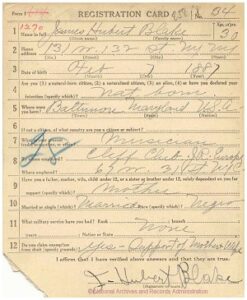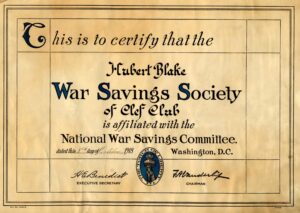YOUR DAILY DOSE OF EUBIE!!!!
James Hubert Blake was born on February 7, 1887, in Baltimore, Maryland—not in 1883 as he would say through most of his life. Why Eubie added four years to his age is anyone’s guess, although his first wife, Avis, was older than him and he may wanted to make their ages closer. Also, he claimed to have composed “Charleston Rag” in 1899, which would have been less believable if he was only 12 years old at the time, rather than 16 as he claimed.

The key piece of evidence for his actual birth year can be found on his World War I draft paperwork. Eubie wasn’t enthusiastic about serving abroad—unlike his employer, bandleader James Reese Europe and his composing partner, Noble Sissle, both of whom enlisted in the 15th New York National Guards, a regiment in late September 1916. Organized by Colonel William H. Hayward, this regiment was created to bring African-Americans into the war effort. Although they could not be members of the US Army due to their race, their unit would eventually see action when it was assigned to the French army. (They didn’t actually sail to France until December 1917, arriving on January 1st, 1918.) Hayward encouraged Europe to form a band as a means of encouraging enlistment and building morale. With funding from Hayward, Europe traveled to Puerto Rico that was known to be the home of many talented brass performers “of color” (most actually of Spanish or mixed Spanish and African descent), while Sissle (as drum major for the band) remained in New York to recruit local players.
While both Sissle and Europe were enthusiastically preparing for the war, Blake showed little interest in serving abroad. Claiming in some later interviews that he was too old to serve—which wasn’t in fact true—Blake more honestly said that he simply had no interest in putting himself at risk for his country. Eventually, Eubie had to register for the draft, but Armistice was declared before he was called up to serve. After the war, Europe and Sissle endlessly needled Eubie for avoiding service, despite the fact that, in Eubie’s words: “everybody [knew] they’re goin’ to the war, but they’re just gonna be musicians. Ain’t none of us was a fighter, you know. But they’d introduce me to girls and they’d say, ‘This is Eubie Blake, the slacker.’”

Eubie stayed in New York and managed the Clef Club orchestra while Europe and Sissle were abroad. Although Blake had not travelled to France, the rosy picture painted by Mitchell of an easy life of gainful employment there was very tempting to him. That temptation was understandable since by early 1918 the opportunities for black musicians had dried up. He must have expressed concerns to Europe about his ability to succeed financially working as his factotum in New York. Europe wrote to Blake on April 14, 1918, to reassure him that, once the war was over, there would be good, lucrative work to be had with his organization: “I know business must be dull for I see and hear it from everybody I know over here. … Just stay on the job and take your medicine. If you think of the comforts you are having over there and think of the hardships we are having over here you’d be happy I am sure to go on ‘suffering’… I have some wonderful opportunities for you to make all the money you need. Eubie, the thing to do is to build for the future, and build securely and that is what I am doing. When I go up I will take you with me. You can be sure of that.”